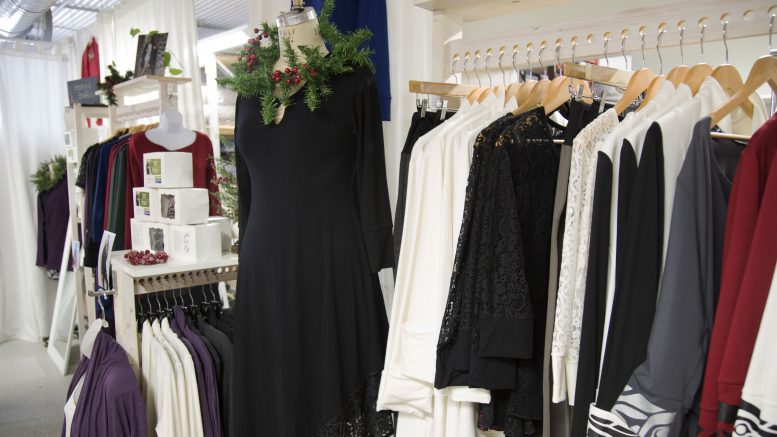Local designer Andréanne Dandeneau, is taking elements of her heritage to create a modern francophone/Indigenous clothing line out of her shop and adjacent factory in South Osborne.
Dandeneau is of French and Ojibwa ancestry and was born in St. Boniface. After completing one year at the University of Manitoba, Dandeneau moved to Montreal to continue her post-secondary education at a French speaking school. In 2004, Dandeneau graduated from one of Canada’s top design programs, LaSalle College’s International School of Fashion, Arts, and Design.
Dandeneau is now the owner of her own fashion label VOILÀ, with stores in Regina, Calgary, Toronto, Edmonton, and Chicago.
Dandeneau includes graphic elements of indigenous and Métis design such as Catherine’s Vine, a stylized version of her great-great-great-grandmother’s Métis flowered embroidery. To reflect her francophone heritage, she uses regal jewel tones and chic European-inspired designs.
However, Dandeneau said it does not need to be obvious to mean that it is francophone or Indigenous design. “Whether my designs have graphic elements or not, the fact that I am Métis and, according to the Canadian constitution, I am an Indigenous person so whatever I design I consider Canadian and Indigenous.”
On the heels of a recent panel discussion at the Canadian Museum for Human Rights Classroom on Nov. 2 about cultural appropriation in the arts, Dandeneau expanded on just what she believes defines cultural appropriation, and what does not.
“If a non-Indigenous writer, singer, or designer is truly inspired by an element of Indigenous culture and acknowledges the source or inspiration and in some ways honours the Indigenous culture, I believe it’s acceptable.”
“To me what is off limits would be a direct copy of the regalia worn in ceremonies or powwows. Powwow dancers must make their own regalia. They must not buy it or pay someone to make it. If an Indigenous designer who would commercially make 100 copies of the same regalia for profit, I would consider that to be cultural appropriation, because it would show a lack of respect and honesty for what the elders consider a sacred element of their culture,” she added.
Dandeneau includes information about the designs on the tag of her clothing and says that her brand is about comfort and pride with timeless designs made with high quality fabric. Her goal is “to educate women to buy less but buy better [quality]. ”She also said it is important for Indigenous designers to be the people who incorporate Indigenous culture into their designs.
“In these times where fake news and knock-offs for profit seem to be more prevalent, the embracing of the seven sacred teachings are more important than ever,” she said.
“If my Indigenous inspired clothing make non-Indigenous women feel good inside and out, I have contributed to honouring my indigenous culture and contributing in a small way to the betterment of humanity.”

